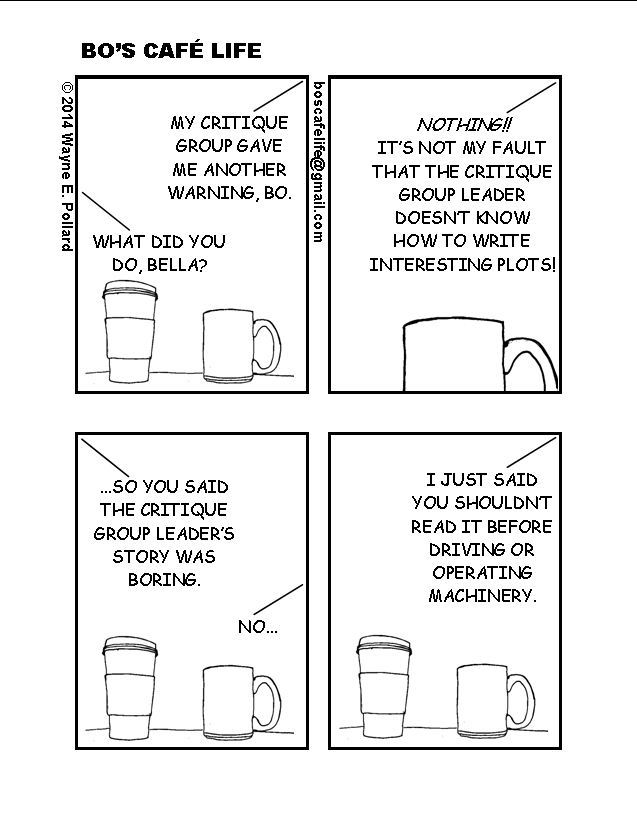Paul Whybrow
Full Member
It's said that when creating a story, nothing should be written that doesn't advance the plot or add to the characterisation of the protagonist and antagonist. But, sometimes not a lot happens!
We're also advised to make the opening of a novel as attention-grabbing as possible, but however energetic our story begins, there comes a time when the pace slows, while our hero recharges his batteries with a meal. How to make that interlude interesting?
With my WIP, I'm 20,000 words in, the good guys reintroduced (it's the fifth story in a series) and the baddies and their crimes described. My detective protagonist knows what's gone awry, but not who perpetrated the murders and thefts. He, and the reader (and me), are at a point where some quiet contemplation of the facts needs to occur, to decide where to go next. Hopefully, a couple of red herrings will send readers in the wrong direction.
My protagonist often revisits crime scenes after he's finished work, attempting to blend in as a civilian. This is helped by him looking like the farmer he once was, and by riding a chopper motorcycle which is at odds with the traditional image of a reactionary copper. He attempts to see the situation through the eyes of a civilian. He's still working as a detective, but these intervals allow me space to portray who he is as a man.
There are times when your protagonist needs to take time out to eat or go the bathroom or sleep—they can't be 'on' all of the time.
Non-stop action, of whatever variety, be it fighting, good humour, arguments or sexual shenanigans, soon becomes tedious without a break. We can only stand so much stimulation! Too much of a good thing becomes boring itself.
I've raved about the crime writing of Walter Mosley, who I've been revisiting recently, and he handles longueurs very well. His private investigators are men of culture, who were raised to question dogma and who've continued their education by reading widely, as well as enjoying music, movies and art. This helps them to reflect upon what's happening to the people they encounter in their sleuthing. They're street tough, but while sitting in a seedy bar watching a potential witness, they might recall a scene from a Dostoevsky novel.
My own protagonist paints watercolours of the moors and the sea for his own enjoyment and as a way of relaxing, but also as a form of meditation. By encouraging his brain to switch off, he gets insights into the case he's investigating.
How do you handle the boring bits, where your character is out doing the grocery shopping or wiling away the evening after a hard day at the office?
Do your characters regularly take time out to indulge in some leisure activity, and is that a separate event, or do you feel compelled to weave in elements of the plot?

We're also advised to make the opening of a novel as attention-grabbing as possible, but however energetic our story begins, there comes a time when the pace slows, while our hero recharges his batteries with a meal. How to make that interlude interesting?
With my WIP, I'm 20,000 words in, the good guys reintroduced (it's the fifth story in a series) and the baddies and their crimes described. My detective protagonist knows what's gone awry, but not who perpetrated the murders and thefts. He, and the reader (and me), are at a point where some quiet contemplation of the facts needs to occur, to decide where to go next. Hopefully, a couple of red herrings will send readers in the wrong direction.
My protagonist often revisits crime scenes after he's finished work, attempting to blend in as a civilian. This is helped by him looking like the farmer he once was, and by riding a chopper motorcycle which is at odds with the traditional image of a reactionary copper. He attempts to see the situation through the eyes of a civilian. He's still working as a detective, but these intervals allow me space to portray who he is as a man.
There are times when your protagonist needs to take time out to eat or go the bathroom or sleep—they can't be 'on' all of the time.
Non-stop action, of whatever variety, be it fighting, good humour, arguments or sexual shenanigans, soon becomes tedious without a break. We can only stand so much stimulation! Too much of a good thing becomes boring itself.
I've raved about the crime writing of Walter Mosley, who I've been revisiting recently, and he handles longueurs very well. His private investigators are men of culture, who were raised to question dogma and who've continued their education by reading widely, as well as enjoying music, movies and art. This helps them to reflect upon what's happening to the people they encounter in their sleuthing. They're street tough, but while sitting in a seedy bar watching a potential witness, they might recall a scene from a Dostoevsky novel.
My own protagonist paints watercolours of the moors and the sea for his own enjoyment and as a way of relaxing, but also as a form of meditation. By encouraging his brain to switch off, he gets insights into the case he's investigating.
How do you handle the boring bits, where your character is out doing the grocery shopping or wiling away the evening after a hard day at the office?
Do your characters regularly take time out to indulge in some leisure activity, and is that a separate event, or do you feel compelled to weave in elements of the plot?





